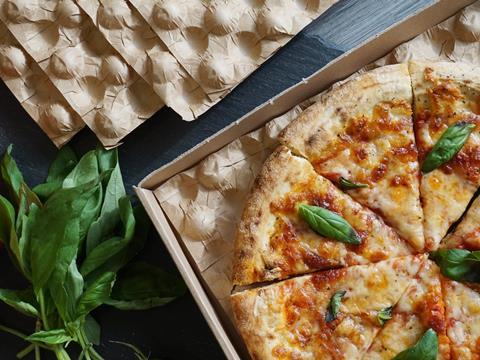
Westpak has launched its HeatWave packaging in an effort to improve the heat retention of delivery and takeaway pizzas by over 20%.
One of the long-standing design flaws in typical takeaway pizza boxes is poor heat retention, the company says. Whether waiting for customer collection or being delivered to customers directly, each minute a pizza remains in its box will lower the temperature of the product, ultimately diminishing its quality, reducing consumer satisfaction and damaging brand reputation.
Westpak states the Heatwave packaging has been designed as a liner sheet that fits into existing standardised cardboard pizza boxes. The liner has a series of alternating concave and convex domes that lift the pizza base away from the bottom of the box.
The dome design keeps the surface area in contact with the pizza base to an absolute minimum, and the aerated under-layer provides a thermal barrier to reduce heat dissipation through the base of the box.
Westpak claims that initial results show impressive heat savings, with 12-inch pizzas shown to be 27% hotter after 15 minutes with the liner and 10-inch pizza shown to be 22% hotter after 15 minutes.
Westpak’s HeatWave liners are apparently manufactured from kraft paper, making them fully recyclable and industrially compostable. It adds that the liners don’t require gluing, folding or other means of being secured, and the liners also act as a grease-shield for the pizza box.
HeatWave is currently being rolled out for trials across several pizzeria chains.
In similar news, last year Coveris and Notpla revealed new takeaway cardboard boxes with a plant-based barrier coating for use at the Erste Bank Open ATP 500 tennis tournament in Vienna. Made from seaweed and plant extracts and designed to replace plastic in packaging applications, Notpla’s barrier coating apparently breaks down naturally in 4-6 weeks at end-of-life.
Sabert Corporation Europe intends to provide a fully recyclable packaging solution for chilled food-to-go, confectionery, and bakery products with its multifunctional Tray2Go. The board bases are reportedly made with FSC certified material, with the lids made from rPET and comprising a minimum of 50% recycled material.
If you liked this story, you might also enjoy:
Report: The ultimate guide to global plastic sustainability regulation
The Brief: Oxo-(bio)degradables: the who, what, and why of breaking down fossil-based plastics
Sustainable Packaging Summit: How Kraft-Heinz uses collaboration to drive innovation
The Brief: Using ocean-bound plastic in packaging – how, why and should we?














No comments yet